Thursday, April 21, 2005
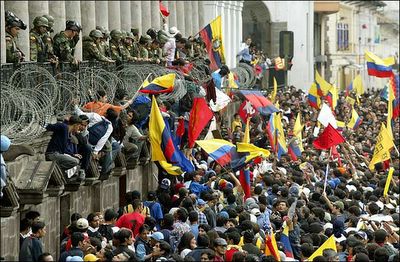
Guillermo Granja/Reuters
Ecuadoreans demonstrating on Wednesday in front of Carondelet Palace in Quito, the seat of government, after the Congress voted to remove President Lucio Gutiérrez. He was replaced by Vice President Alfredo Palacio.
Ecuador's Leader Flees and Vice President Replaces Him
By JUAN FORERO
BOGOTÁ, Colombia, April 20 - President Lucio Gutiérrez of Ecuador fled his presidential palace on Wednesday after the Congress, meeting in special session, voted to remove him. The Congress then swore in Vice President Alfredo Palacio, a 66-year-old cardiologist, to replace Mr. Gutiérrez, 48, a former army colonel who had faced mounting street protests against what critics called an illegal overhaul of the Supreme Court.
Mr. Gutiérrez, who took office in January 2003, became the third president since 1997 to be ousted from power in the small but oil-rich Andean country, which has close economic ties to the United States. In 1997, Abdalá Bucaram was declared mentally unfit to govern and fled into exile. In 2000, President Jamil Mahuad was ousted in a coup supported by Mr. Gutiérrez, then an army colonel.
Ecuadorean protesters accused all three of corruption, mismanagement and a strong-arm governing style.
"Today, the dictatorship, the immorality, the arrogance and the fear have ended," Dr. Palacio said in a speech broadcast on Colombia's Caracol radio network. "From today, we will restore a republic with a government of the people."
Dr. Palacio did not say whether he would call new elections. It was also not clear if the majority of Congress and the Ecuadorean public would support him as he tries to steer the country out of paralysis. Ecuador does not have a Supreme Court - the Congress disbanded it on Sunday - and its myriad political parties are bitterly divided.
"Logic would have it that Palacio would stay the year and a half that remains, organize elections and construct the judicial system," said Adrián Bonilla, a political analyst in Quito, the capital.
Mr. Gutiérrez fled the presidential palace in a military helicopter, infuriating protesters who assumed he would flee the country, as have other former leaders. Demonstrators then closed down Quito's international airport to prevent his escape, while the attorney general's office announced that a warrant had been issued for his arrest for having ordered troops to use violence to put down anti-government demonstrations.
But Wednesday evening, Brazil issued a statement saying that Mr. Gutiérrez was in that country's embassy in Quito and that the Foreign Ministry was making the necessary arrangements to grant him asylum.
Mr. Gutiérrez, who had run for president as a populist friend of the poor, lost much of his public support almost as soon as he took office. Ecuadoreans were increasingly dissatisfied with his austere economic policies, which had produced a 6 percent growth rate in 2004 but also hardships for ordinary citizens.
But it was Mr. Gutiérrez's role in twice dismissing the Supreme Court, most recently last Friday, that helped create a firestorm he could not survive. An interim court installed by Mr. Gutiérrez's allies had cleared former President Bucaram of corruption charges, permitting his return to Quito earlier this month.
Protests picked up momentum on April 13, with demonstrators accusing Mr. Gutiérrez of a power grab. In Quito, where the protests began, a small FM radio station, La Luna, marshaled people for daily anti-government rallies. "I feel like we lit a fuse and that there was so much repressed anger that it just kept burning," said Ramiro Pozo, the news director at La Luna.
On Wednesday, anti-government lawmakers voted to end Mr. Gutiérrez's term based on a vague article in the Constitution that permits a president's removal for "abandonment of the post." The congressmen said that by disbanding the Supreme Court and calling for a state of emergency on Friday the president had violated the Constitution.
The president had insisted to reporters that he would not resign, but on Wednesday his political situation became untenable after the military withdrew its support. At a news conference, Gen. Víctor Hugo Rosero, head of the armed forces, said the military could not "remain indifferent before the pronouncements of the Ecuadorean people." Then the head of the national police force, Gen. Jorge Poveda, also resigned, saying, "I cannot continue to be a witness to the confrontation with the Ecuadorean people."
The police chief was referring to protests that turned violent Tuesday night as tens of thousands of protesters clashed with security forces, who used tear gas and high-pressure water hoses to disperse them. International radio reports said that two people had been killed, including a foreign news photographer.
Opposition members of Congress had been trying to oust Mr. Gutiérrez since late last year, accusing him of corruption and nepotism. In November, they failed to muster enough votes to impeach him. Mr. Gutiérrez had bested his opponents with the support of the Roldosista party, led by Mr. Bucaram, who had been in exile avoiding corruption charges since his ouster.
In return for Roldosista support, government opponents said, Mr. Gutiérrez's allies in Congress disbanded the Supreme Court and named a new one that, in March, cleared Mr. Bucaram. Mr. Bucaram was also being sought Wednesday night.
Carla D'Nan Bass in Quito and Mónica Trujillo in Bogotá contributed reporting for this article.
Copyright 2005 The New York Times Company | Home | Privacy Policy | Search | Corrections | RSS | Help | Back to Top

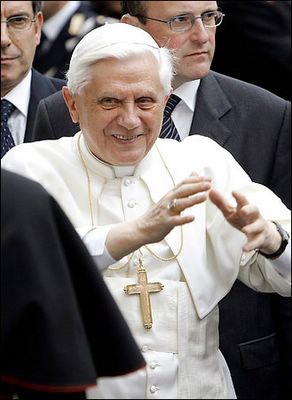
Tony Gentile/Reuters
Pope Benedict XVI greeted a crowd outside his residence today in the Vatican.
New Pope Reappoints Top Vatican Officials
By DANIEL J. WAKIN
VATICAN CITY, April 21 - Pope Benedict XVI acted quickly today to ensure stability and continuity with the reign of John Paul II, reappointing his secretary of state and keeping leaders of the Roman Catholic Church's bureaucracy in place for the time being.
The moves came two days after Benedict's election, which followed a papacy that was immensely popular for much of the world. But one of the weaknesses attributed to John Paul was a relative inattention to the Vatican machinery. It remains to be seen what permanent moves Benedict will make.
When he was Cardinal Joseph Ratzinger and the powerful head of the Vatican's office in charge of doctrine, he was an advocate of a strong centralized church, and sometimes questioned the need for the size of the church bureaucracy.
Today, even before his formal installation on Sunday, Benedict made a major decision by naming Cardinal Angelo Sodano as his secretary of state. Cardinal Sodano had served John Paul in the job, which is the second most powerful position in the church and roughly akin to prime minister, for 14 years.
Cardinal Sodano wielded much power in those years, carrying out delicate missions with foreign powers, traveling regularly with the pope and replacing an increasingly infirm pontiff at religious events. Given his prominence, he undoubtedly carried clout in the conclave that elected Benedict and most likely swung the votes he influenced to the new pope, Vatican analysts said.
The pope also kept Cardinal Sodano's two deputies in place.
The secretary of state appointment is generally for five years. Cardinal Sodano is 77. High Vatican officials are generally required to tender their resignations at 75, although the pope can ask them to stay on. It is possible, then, that Benedict may be making a change soon.
The other major Vatican departments - those responsible for bishops, the liturgy, saints, the sacraments, priests and education - are also headed by cardinals.
Benedict confirmed the cardinals who had been in the jobs but used a Latin phrase meaning, "until something else is provided for," suggesting they are provisional appointments.
One major gap remained: the leader of the Congregation for the Doctrine of the Faith, where Benedict presided for 24 years as Cardinal Joseph Ratzinger under John Paul. He made the post one of the most valuable in the church, enforcing doctrinal rectitude on theologians, bishops and other Vatican departments.
Possible candidates include Christoph Schönborn, the archbishop of Vienna, and Angelo Scola, the patriarch of Venice.
As the days go by, Pope Benedict's official public schedule is beginning to fill up. After his installation Mass in St. Peter's Square on Sunday, he will go Monday to the tomb of the Paul the Apostle, at the Basilica of St. Paul Outside the Walls in Rome, the Vatican said.
The visit is intended to express "the inseparable tie of the Church of Rome with the Apostle of the People," the Vatican said.
On Friday he meets with all the cardinals present in Rome, including those over 80 who were not eligible to vote in the conclave, and on Saturday he receives journalists accredited to the Vatican in the Paul VI auditorium, where John Paul held his regular Wednesday general audience.
The appearances are part of the ways, both large and small, that a curial cardinal is being transformed into a pope with a capital P: a pastor of the flock and the public face of worldwide Catholicism. Today, hundreds of people waited outside his old apartment close by the Vatican to get a glimpse of the new pope. He was greeted by cheers when he came outside, smiled and waved briefly before getting into a car to be driven the short distance to the Vatican.
On Wednesday, his second day as Pope Benedict, Italian television showed him in his white papal vestments entering the papal apartment for the first time, sitting at his desk, walking outside briefly, acknowledging the applause of his former employees on a visit to his old office, greeting people on the street outside the apartment.
Copyright 2005 The New York Times Company | Home | Privacy Policy | Search | Corrections | RSS | Help | Back to Top

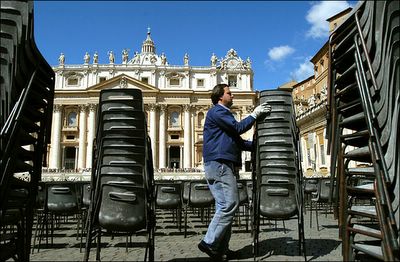
Jake Price for The New York Times
In preparation for Pope Benedict XVI's first mass as pope workers unloaded chairs in St. Peter's Square Thursday. Because it is the first mass of Benedict's papacy tens of thousands are expected to attend.
A Swift Surge That Defied Expectations
By DANIEL J. WAKIN
ROME, April 20 - Joseph Ratzinger of Germany became Pope Benedict XVI in rapid fashion, surging to election in a scant four votes over less than 24 hours of conclave.
How it happened began to emerge Wednesday, once the cardinals who chose him left the secret gathering and were no longer bound by an order not to make public comments, a condition imposed by Cardinal Ratzinger himself the week before it started.
Just exactly how Benedict came to be elected is, naturally, a secret, given the strict oaths to keep the proceedings private, as demanded by Pope John Paul II. Cardinals who spoke to reporters afterward stuck by their oath.
However, it was his commanding performance in the weeks leading up to the conclave that helped seal his election, several cardinals said Wednesday.
His deep knowledge of the Vatican bureaucracy, linguistic ability and intellectual heft also played important roles, the cardinals said in interviews and news conferences. Cardinal Ratzinger was widely believed to be a leading vote-getter going in, but some Vatican analysts and prelates thought he had only a modest chance of election. They cited his age, 78, and reputation for divisiveness. Most thought he would swing his votes to a fellow conservative.
But the cardinals defied those expectations.
Cardinal Cormac Murphy-O'Connor, archbishop of Westminster, said he was "not altogether surprised" by the outcome.
"I think everyone knew that of those who might be created pope, he who was formerly Cardinal Ratzinger was a very strong candidate, notwithstanding age or anything else," he said.
In picking Cardinal Ratzinger, the cardinals were clearly drawn to his defense of traditional Roman Catholic doctrine in the face of what he called the "dictatorship of relativism," or shifting winds of belief in a secular society, during the conclave-opening Mass on Monday. His election also indicated that they believed shoring up the fundamentals of the faith was a main priority, despite extensive discussion among the cardinals about the church's needs in Latin America and elsewhere outside Europe.
But it was also his dignified celebration of John Paul's funeral Mass on April 8, his guiding hand at the cardinals' daily meetings during the period between popes and the pre-conclave Mass that helped convince the cardinals. He fulfilled those roles as dean of the College of Cardinals.
"I think he showed great leadership quality, which must obviously have influenced what people thought about him," said Cardinal Wilfrid Fox Napier of South Africa.
Under John Paul, Cardinal Ratzinger was prefect of the Congregation for the Doctrine of the Faith for nearly 25 years, in effect serving as the guardian of orthodoxy. He had broad authority to punish errant theologians and rule on many aspects of church life.
Cardinal Napier said that many of the 115 cardinal electors had been well aware of Cardinal Ratzinger's reputation as a hard-line corrector of error, or might even have seen it up close. But in recent weeks they had a chance to experience his "gently humble" aspect, as well as a willingness to work with other cardinals in a collegial way.
"Probably many of us did not know that side of Cardinal Ratzinger," he said. "That's a side of his character that the job he was doing before did not allow much scope to."
Cardinal Rosalio Castillo Lara of Venezuela agreed that Cardinal Ratzinger's performance after John Paul's death had been of critical importance.
"He did it very well, with great serenity, much tact and also much humility," Cardinal Castillo was quoted as saying by the Turin daily La Stampa. Benedict's abilities in English, French and Italian and experience in the Curia helped. That he was one of only three cardinal electors chosen by Pope Paul VI (John Paul chose the rest during his long tenure) gave him "great credit before the world," Cardinal Castillo said.
Cardinal Christoph Schönborn, archbishop of Vienna, said, "You can deduce that we were convinced that he was the man God had indicated to us."
Comments by cardinals before the conclave and comments by their aides, analysis by papal historians and reports by astute Italian "vaticanisti," or Vatican press specialists, can give hints about what happened inside the Sistine Chapel, where the cardinals were locked in Monday afternoon with Michelangelo's frescoes and the task of electing a spiritual leader for 1.1 billion Catholics.
Most agreed that Cardinal Ratzinger entered the conclave as the man with most support, perhaps 30 to 50 votes out of the necessary two-thirds, or 77.
At the first vote Monday night, it must have become clear that his position was strong enough to be a viable candidacy. With the votes read out loud during the balloting, the progress of Cardinal Ratzinger's candidacy must have been apparent. The two ballots on Tuesday morning increased his lead, and he was elected on the fourth.
"That is certainly a very evident sign of great concord and agreement about what God's will indicated to us," Cardinal Schönborn said.
Cardinal Murphy-O'Connor gave some insight into how the votes flowed. "You say, 'For the good of the church, this man seems to be the one that most of the cardinals want,' " he said. "If a cardinal has another view, he would say, 'Maybe they are right, and for the unity of the church and what I see is right, I will maybe change my vote and vote for him.' "
Cardinal Francis George of Chicago said at a news conference that the choice "was clear almost from the beginning."
A more detailed analysis is almost impossible to present with any certainty, but that did not stop the vaticanisti.
Several said that the opposition to Cardinal Ratzinger by the generally more progressive cardinals lacked unity, and that seeing his strength, those cardinals wanted to avoid a drawn-out conclave that would have signaled a divided church.
Marco Politi of La Repubblica suggested that support had been coalescing around Cardinal Ratzinger as early as Christmas, given the sense that John Paul's health was taking a serious turn for the worse.
Going into the conclave, Cardinal Ratzinger had active help in mustering votes from powerful cardinals of the Roman Curia in charge of major departments, including Darío Castrillón Hoyos, Alfonso López Trujillo and Julián Herranz, a priest member of the conservative lay group Opus Dei. Giovanni Battista Re, Crescenzio Sepe and Angelo Sodano were also mentioned as Ratzinger backers, perhaps in the second round.
Several of these may have done some active campaigning Monday night, after the first ballot, Corriere della Sera reported. Cardinal Schönborn may have also helped the candidacy. He is another Ratzinger follower and, as archbishop of Vienna, a prelate with strong East European contacts.
The tipping point came, Mr. Politi wrote, when two crucial Italians - Camillo Ruini, John Paul's longtime vicar for Rome, and Angelo Scola, the patriarch of Venice, who himself was often mentioned as a candidate - threw their support Cardinal Ratzinger's way. Cardinal Scola had worked in Cardinal Ratzinger's congregation.
The prospect of a drawn-out battle scared off the liberal opposition, and their leader, Carlo Maria Martini, sent his votes to Cardinal Ratzinger, Mr. Politi suggested. Cardinal Martini may have had an inkling of what might be ahead. On the weekend before the conclave, a priest who had seen him said in an interview, Cardinal Martini appeared distressed.
Sometime late Tuesday afternoon - probably between 5 and 5:30 p.m., given the procedures that would have been followed and the timing of the smoke announcing that a pope had been selected - Cardinal Ratzinger reached the 77 votes needed for election. The cardinals gasped, and then clapped, Cardinal Murphy-O'Connor recounted. Cardinal Joachim Meisner of Germany burst out crying, he told The Associated Press.
The new pope had his head bowed, and was probably praying.
"He couldn't have been unaware," Cardinal Murphy-O'Connor said, "that this was quite likely to happen."
Copyright 2005 The New York Times Company | Home | Privacy Policy | Search | Corrections | RSS | Help | Back to Top

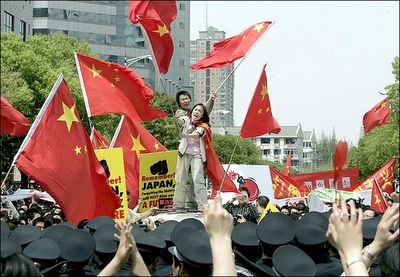
Liu Jin/Agence France-Presse - Getty Images
On Saturday, Shanghai held a clearly stage-managed rally against Japan. To some, it recalled the Cultural Revolution.
LETTER FROM ASIA
By Playing at 'Rage,' China Dramatizes Its Rise
By HOWARD W. FRENCH
SHANGHAI, April 19 - The banners had been carefully printed, the slogans memorized, and the students and young unleashed onto the streets of China's largest, most sophisticated city, where they were to speak sacred truths and make the enemies of the people tremble.
Chinese today have little experience of mass organized protests, so when the Government tolerated - some would say encouraged - a huge anti-Japanese demonstration here that flirted with turning into a riot over the weekend, for many it bore echoes of the mass manipulation of students of another era, the Cultural Revolution.
For hours on Saturday, thousands of Chinese, from teenagers to people in their 30's, lay siege to the Japanese consulate in this city, smashing its windows and defacing its walls with a copious rain of rocks and bottles. But for all the expressions of anger against Japan by people far too young to have memories of China's brutal subjugation by its neighbor, at its most basic level this was a festival of runaway nationalism, of a government-nurtured Chinese-ness.
Declaring themselves to be all one people, the demonstrators proclaimed their love of the police who escorted them as they marched to the consulate, smashing Japanese shops along the way. Banners extolled Chinese greatness, in contrast to little Japan, chanters called for their homeland to stand tall, and talk was dominated by Chinese "feelings," a word repeated over and over, as if no other feelings counted.
Revealingly, people who had lived through the real Cultural Revolution, not the sanitized one taught in China's history books, watched from the sidelines with looks of amazement and worry. They were old enough to remember just how badly things can go when intoxication is the order of the day, and laws are swept aside by feelings.
"I watched the police cars escorting the demonstrators and felt this all looked familiar, like an official event in the Cultural Revolution, but those drew bigger crowds and were more emotional," said Zhu Xueqin, a historian at Shanghai University who emerged from a public library to watch the march go by. "I observed it as a bystander, and the people observing around me looked indifferent, seemingly full of reservations."
Shanghai is the most dazzling symbol of a China that has changed so much since the Cultural Revolution as to be almost unrecognizable. But in some important ways, most notably the government's will to control information and through it people's minds, the events of the weekend here and their aftermath show that this country has barely changed at all.
The Maoist slogans of 40 years ago have been replaced by anti-Japanese watchwords, and then as now, few of those caught up in the excitement paused to examine the relationship of today's slogans to the truth. Here were students mouthing such claims as "Japan has never apologized to China," or "Japanese textbooks whitewash history." Many Japanese textbooks have recently de-emphasized atrocities committed in China, and some have been widely distributed. But in China, the most tendentious of them is the one cited as a representative sample, although it is used by less than 1 percent of Japanese schools.
Others said, trembling with conviction, that Japan wants to keep China down, or even instigate the country's breakup. Never mind that for over two decades, Japan has been a leading source of development assistance for China - to the tune of $30 billion in low interest loans - helping build everything from Shanghai's futuristic airport to expensive highway and water systems in the country's vast, impoverished west.
Few in the Chinese crowds, including many educated in the country's best schools, seemed aware of facts like those, or of any other side to the story save what could be fit into the dichotomy of a China that is essentially good and a Japan that is predatory, evil, conniving or, in a word heard over and over, "disgusting."
Like anything that involves information in China, this ignorance seems the result of careful planning. Since diplomatic relations between the two countries were normalized in 1972, for example, Japanese officials have apologized numerous times to China for the suffering their country inflicted in the 20th century. In 1995 on the 50th anniversary of the war's end, for example, Prime Minister Tomiichi Murayama spoke of the " tremendous damage and suffering" his country had caused, adding, "I regard, in a spirit of humanity, these irrefutable facts of history, and express here once again my feelings of deep remorse and state my heartfelt apology."
But China's state-controlled media have usually focused on finding fault with each Japanese pronouncement, sustaining the belief that Japan has indeed never apologized.
The largest question, perhaps, is why China would so carefully sustain anger at Japan.
One possibility is that in recent years, the legitimacy of China's leadership has rested on few things so much as the idea of inevitability - a destined ascension of the country to prosperous world-power status and a return to the unquestioned pre-eminence in the East that it enjoyed before the 20th century. In this picture there is little room for Japan, a country that has derailed China's ambitions before, and suddenly seems unwilling to fade.
This could help explain China's reactions to Tokyo's bid for a United Nations Security Council seat and discussions under way in Japan about revising the country's so-called peace constitution, as well as Chinese nervousness about Taiwan, which Japan, together with the United States, recently called a joint security concern.
By midweek, signs were multiplying that China's leaders were rethinking their confrontation with Japan, at least at the level of public relations. With the ugliness toward their neighbor threatening a loss of international sympathy on other issues, China first reportedly made a quiet offer to repair Japan's damaged consulate, and on Tuesday urged an end to demonstrations.
Left aside in the weekend's atmospherics in the effort to dispel them was the question of whether China has done a better job teaching history than its neighbor. In the West, it is accepted as fact that more Chinese were killed by the policies of Mao Zedong than by the Japanese, including many by summary execution and other atrocities that are glossed over in Chinese textbooks. In those books, Mao is still treated with reverence.
China also claims never to have seized territory from a neighbor, but China attacked India by surprise in 1962 and the details of other campaigns, from Korea and Xinjiang in the north to Vietnam and Tibet in the country's south and west, are also absent from textbooks.
More remarkable than any glance at the receding past, however, was the way news of the anti-Japanese demonstrations has been treated in China in the here and now. Chinese authorities televised notices that the protests had not been approved on the eve of Saturday's anti-Japanese demonstration, which served as much as anything else as an announcement of the event. The news the next day avoided all mention of disorder. Similarly there were no images of young people pelting the Japanese consulate at their leisure, within arm's reach of paramilitary police.
The seeming contradictions in all of this were not lost on all Chinese, however. Discussions have raged all week on the Internet, with many questioning their countrymen's behavior and the government's permissiveness toward anti-Japanese violence. "How shameful is it that to release our emotions we damaged the property of our countrymen and bullied the weak," wrote one forum participant? "You call yourselves patriotic? Patriotic what?"
Copyright 2005 The New York Times Company | Home | Privacy Policy | Search | Corrections | RSS | Help | Back to Top

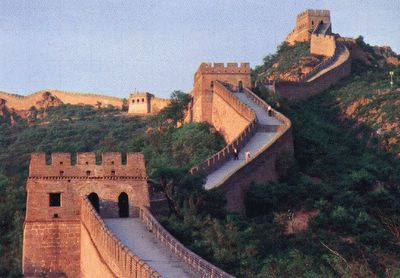
Great Wall Of China
EDITORIAL
Blame China?
Members of Congress, egged on by American manufacturers, are threatening to slap punitive tariffs on Chinese goods unless China increases the exchange rate of its currency, the yuan, thus raising the price of Chinese imports here. Some Senate Democrats are even threatening to block President Bush's choice for the United States trade representative, Rob Portman, unless the administration also espouses get-tough tactics. This is protectionism raising its ugly head, and an all-around dreadful strategy. That's only in part because Mr. Portman, one of the president's better nominations, deserves confirmation. Worse, it's based on a misunderstanding of both China's financial situation and the cause of American economic woes.
At the heart of this debate is China's policy of linking the value of the yuan to the value of the dollar. That was called sound policy when the dollar was strong. But now that it is weak, Congressional critics call it manipulation because it makes already inexpensive Chinese goods even cheaper the world over. As proof that the yuan is undervalued, the tariff seekers point to the United States' ballooning trade deficit with China, which accounted for about one-fourth of the United States' gargantuan global trade imbalance of $617 billion in 2004.
The trade deficit and the loss of American manufacturing jobs are very serious problems. It would be nice to think that they would self-correct if China would only change its ways. Nice, but wrong. Most of the trade gap with China is caused by Americans' insatiable appetite for Chinese imports, for which there are few domestic substitutes. And even if the yuan's exchange rate is too low - a point on which economists differ - it is a minor contributor to the trade deficit. If China let the yuan appreciate by 20 percent, and most other Asian currencies followed suit, the deficit would probably decline by only about one-fifth over the next year or two. That's not nearly enough to bring the American trade imbalance into a range that is generally considered sustainable.
Tariff-mongering politicians don't necessarily want to believe this. "Many of us feel they're playing this country for a fool," Senator Charles Schumer of New York fumed at a recent hearing. Treasury Secretary John Snow, to his credit, explained at that hearing how a premature yuan revaluation might do more harm than good.
Pegging a currency to the dollar is perfectly legitimate for a country like China with a fragile banking system and rudimentary capital markets. China's problem is that its underdeveloped finance sector exists hand in hand with a surging economy, which puts pressure on the yuan to appreciate. That state of affairs has attracted huge amounts of speculative capital into China, in anticipation that its government will soon allow the yuan to rise. Such speculative capital is destabilizing - feeding, for example, a worrisome Chinese real estate bubble.
This helps explain why China's leaders are so nervous about letting the yuan appreciate. They need a more flexible currency, sooner rather than later, both for the sake of trade relations and to gain more control over their own economy. But if China makes a small currency adjustment, the speculators will be rewarded and will pour in more money in expectation of future upward moves, further destabilizing the economy. And if China makes a large adjustment, it will incur sharp losses in its huge dollar holdings because an upward move in the yuan means a downward move in the dollar. That would only weaken its financial sector.
It's not in China's interest, or in the interest of global economic stability, for China to move the yuan before its officials have coalesced around a strategy for doing so. And American lawmakers should be thinking twice about what the impact at home could be if the yuan is revalued. America's lack of savings - by the government and individuals - is the biggest contributor to global imbalances, making it necessary to "import" billions of dollars of foreign capital daily to cover our budget and trade deficits.
China is America's second-most-important lender, after Japan, and it will become even more important if other Asian nations curb their lending, as they have recently indicated they may. As long as China links the yuan to the dollar, it needs to buy large quantities of United States securities to prop up the dollar, a process that has helped keep American interest rates down and economic growth up.
If China loosened its currency's peg to the dollar, or removed it altogether, it wouldn't need to buy up dollar-based assets at its current torrid pace. The result could be a rise, even a sharp rise, in United States interest rates and, as a corollary, a falloff in economic growth. Neoprotectionist members of Congress should be careful about what they ask for.
Copyright 2005 The New York Times Company | Home | Privacy Policy | Search | Corrections | RSS | Help | Back to Top

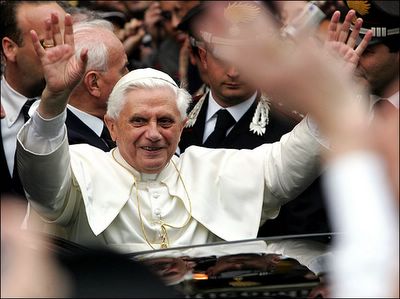
Andrew Medichini/Associated Press
Pope Benedict XVI greeted a crowd of well-wishers yesterday as he made a quick visit to his former home in Rome a few blocks from the Vatican
New Pope Reappoints Top Vatican Officials
By DANIEL J. WAKIN
VATICAN CITY, April 21 - Pope Benedict XVI acted quickly today to ensure stability and continuity with the reign of John Paul II, reappointing his secretary of state and keeping leaders of the Roman Catholic Church's bureaucracy in place for the time being.
The moves came two days after Benedict's election, which followed a papacy that was immensely popular for much of the world. But one of the weaknesses attributed to John Paul was a relative inattention to the Vatican machinery. It remains to be seen what permanent moves Benedict will make.
When he was Cardinal Joseph Ratzinger and the powerful head of the Vatican's office in charge of doctrine, he was an advocate of a strong centralized church, and sometimes questioned the need for the size of the church bureaucracy.
Today, even before his formal installation on Sunday, Benedict made a major decision by naming Cardinal Angelo Sodano as his secretary of state. Cardinal Sodano had served John Paul in the job, which is the second most powerful position in the church and roughly akin to prime minister, for 14 years.
Cardinal Sodano wielded much power in those years, carrying out delicate missions with foreign powers, traveling regularly with the pope and replacing an increasingly infirm pontiff at religious events. Given his prominence, he undoubtedly carried clout in the conclave that elected Benedict and most likely swung the votes he influenced to the new pope, Vatican analysts said.
The pope also kept Cardinal Sodano's two deputies in place.
The secretary of state appointment is generally for five years. Cardinal Sodano is 77. High Vatican officials are generally required to tender their resignations at 75, although the pope can ask them to stay on. It is possible, then, that Benedict may be making a change soon.
The other major Vatican departments - those responsible for bishops, the liturgy, saints, the sacraments, priests and education - are also headed by cardinals.
Benedict confirmed the cardinals who had been in the jobs but used a Latin phrase meaning, "until something else is provided for," suggesting they are provisional appointments.
One major gap remained: the leader of the Congregation for the Doctrine of the Faith, where Benedict presided for 24 years as Cardinal Joseph Ratzinger under John Paul. He made the post one of the most valuable in the church, enforcing doctrinal rectitude on theologians, bishops and other Vatican departments.
Possible candidates include Christoph Schönborn, the archbishop of Vienna, and Angelo Scola, the patriarch of Venice.
As the days go by, Pope Benedict's official public schedule is beginning to fill up. After his installation Mass in St. Peter's Square on Sunday, he will go Monday to the tomb of the Paul the Apostle, at the Basilica of St. Paul Outside the Walls in Rome, the Vatican said.
The visit is intended to express "the inseparable tie of the Church of Rome with the Apostle of the People," the Vatican said.
On Friday he meets with all the cardinals present in Rome, including those over 80 who were not eligible to vote in the conclave, and on Saturday he receives journalists accredited to the Vatican in the Paul VI auditorium, where John Paul held his regular Wednesday general audience.
The appearances are part of the ways, both large and small, that a curial cardinal is being transformed into a pope with a capital P: a pastor of the flock and the public face of worldwide Catholicism. Today, hundreds of people waited outside his old apartment close by the Vatican to get a glimpse of the new pope. He was greeted by cheers when he came outside, smiled and waved briefly before getting into a car to be driven the short distance to the Vatican.
On Wednesday, his second day as Pope Benedict, Italian television showed him in his white papal vestments entering the papal apartment for the first time, sitting at his desk, walking outside briefly, acknowledging the applause of his former employees on a visit to his old office, greeting people on the street outside the apartment.
Copyright 2005 The New York Times Company | Home | Privacy Policy | Search | Corrections | RSS | Help | Back to Top
